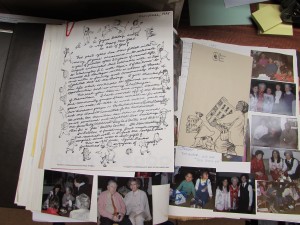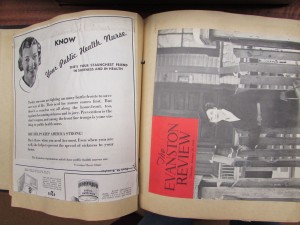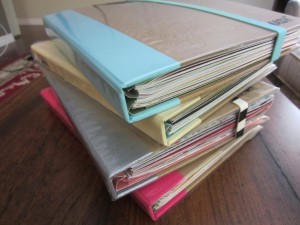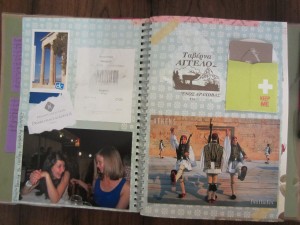The job of an archives is to collect and protect materials of value that others might throw out. However, every document and object that an archivist comes across cannot be kept. Archivists must constantly make difficult decisions about what is most important and what is permanently valuable in a process called appraisal. Some things must be discarded in order to leave room in the archive for the future. At the WLA, we focus on the lives and contributions of women.
Though it seems an impossible task to decide what from our present will be viewed as important in the future, we have all asked ourselves similar questions on a more personal level. Will this be useful to be later? What can I keep to remember this great experience? What do I do with all of these mementos?
Many of us make these decisions and create our own personal archives. For me, my personal archives takes the form of a scrapbook.
Scrapbooking has in recent years become a popular hobby enjoyed by many who turn photos and bits of paper into incredible art that preserves significant life moments on a page. Many forms of social media can even be seen as a digital form of scrapbooking.
Though it has become more elaborate through time, scrapbooking has been a common practice since the 19th century. In those days, large cities had dozens of daily newspapers filled with the new technology of photography, and leaving people both captivated and overwhelmed by the information that they encountered on a daily basis. To deal with the piles of newspaper that began to fill their homes, people began cutting out the stories and photos that most interested them and pasting them into books. These individuals preserved the evidence of events that shaped their lives and the information that they found useful.

Patricia Caron Crowley’s collection includes over 100 scrapbooks which document her life from childhood and her professional activities.

The Visiting Nurse Association of Evanston kept this scrapbook from 1941-1973 to document local health news and the organization’s activities.
Several collections at the WLA include scrapbooks. Examples are the Mundelein College collection, the Visiting Nurses Association collection, and the collection of Patricia Caron Crowley. These not only inform us about how individuals made and used scrapbooks at the time, but they also tell us what the person saw as significant in their own life.
Because I lack the patience and artistic talent to create the beautiful, elaborate scrapbooks that are currently popular with hobbyists, my books more resemble the “cut it out and slap it in a book” method of 19th century scrapbooks. I love to collect little things that seem useless or were meant to only serve a temporary purpose and then be discarded, and save them as a snapshot of that fleeting moment. In fact, I tend to save too many things that get thrown into a bag until they are “processed,” to use the archival term, and put into a scrapbook. Scrapbooking helps me to organize my memories and limit the souvenirs I keep to what I can fit in the book. Going through the process of discarding the souvenirs of my happiest days, I can better understand the appraisal process of archivists. We keep what tells the story. We keep what will help us remember and help future generations understand.
In thinking about this topic, I realized one way my scrapbook is different from an archives. When I make my appraisal decisions and create my book of personal memories, I very often stick to preserving the pleasant memories and discarding the bad. Do I need to make a note of the family arguments on Christmas morning or will the cute Santa gift tag tell a better story? Do I preserve the Starbucks receipt to commemorate that terrible fight with my best friend? Who wants those memories? An archivist, however, must always take the good with the bad. The historical record is not complete and truthful if it does not include successes and failures. The stories in our archives of discrimination and conflict and the ways that women struggled against it can help future generations better understand how their communities and country were shaped. The creativity of these educators, activists, artists, and politicians could spark new ideas for how to handle future conflicts.
When I create a new page in my scrapbook and imagine sharing it with my future children and loved ones, maybe I should consider this important role an archives plays. Events that may be embarrassing or painful now could be the memories that best tell the story of my life in my personal archives.
Caroline is a Graduate Assistant at the WLA and is working on her Master’s in Public History at Loyola University Chicago. When not scrapbooking, she spends her spare time exploring Chicago, interpreting dreams and watching cheesy movies with her husband.
Loyola University Chicago’s Women and Leadership Archives Blog is designed to provide a positive environment for the Loyola community to discuss important issues and ideas. Differences of opinion are encouraged. We invite comments in response to posts and ask that you write in a civil and respectful manner. All comments will be screened for tone and content and must include the first and last name of the author and a valid email address. The appearance of comments on the blog does not imply the University’s endorsement or acceptance of views expressed.


